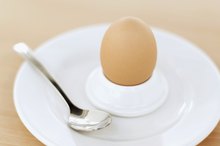Bodybuilding and Sunflower Seeds
Sunflower seeds are a nutritious, tasty and convenient snack 2. Available both shelled and unshelled, sunflower seeds can be eaten raw or roasted and feature a mild, nutty flavor and a crunchy, satisfying consistency. High levels of protein, essential fatty acids, minerals and vitamins make sunflower seeds an ideal food for bodybuilders.
Protein and Fiber
According to the USDA National Nutrient Database, a quarter cup of sunflower seeds contains a substantial 6.19 g of protein, essential for increasing muscle mass and improving muscle tone 12. Sunflower seeds also are a good source of fiber, which helps to speed the elimination of waste products from the body 2. The 186 calories contained in a quarter cup of sunflower seeds are a reasonable investment given the substantial nutritional benefits 2.
Vitamin E
Nutritional Facts of David Sunflower Seeds
Learn More
Sunflower seeds are rich in vitamin E, with a quarter cup providing 8.35 mg in the form of tocopherols 2. Vitamin E prevents cell membrane damage by halting the destructive action of free radicals, and might accelerate post-workout recovery while helping to prevent inflammation. In addition, it has cardio-protective effects. Bodybuilding.com recommends consuming at least 15 mg of vitamin E a day from food sources such as nuts and seeds 5.
Linoleic Acid
Sunflower seeds are high in fat, with a 32 g serving, or one quarter cup, containing 15.94 g of fat. The good news for bodybuilders is that the majority of the fat is beneficial. According to Fit Day, the monounsaturated fats in sunflower seeds can help reduce levels of harmful LDL cholesterol 2. Sunflower seeds also are rich in linoleic acid, an essential omega-6 fatty acid particularly beneficial to bodybuilders thanks to its role in building, repairing and maintaining muscle tissue 4. Linoleic acid produces gamma-linoleic acid in the body, which helps to control inflammatory response.
- Sunflower seeds are high in fat, with a 32 g serving, or one quarter cup, containing 15.94 g of fat.
- According to Fit Day, the monounsaturated fats in sunflower seeds can help reduce levels of harmful LDL cholesterol 2.
Vitamins and Minerals
Theragran-M Advanced Multivitamin Ingredients
Learn More
According to the USDA, a quarter cup of sunflower seeds contains 41 mg of magnesium, particularly vital for bodybuilders thanks to its role in forming healthy bones and producing energy 2. The same quarter cup of sunflower seeds also provides 25.4 g of selenium, a trace mineral and antioxidant essential for increasing muscle mass and improving muscle tone 2. In addition, sunflower seeds provide healthful amounts of assorted B-complex vitamins, with a quarter cup yielding 2.253 mg of Vitamin B5, or pantothenic acid. According to "The New Encyclopedia of Modern Bodybuilding," by Arnold Schwarzenegger and Bill Dobbins, pantothenic acid is important in energy production and utilization; it also promotes healthy adrenal glands, responsible for producing hormones that combat stress 3. Vitamin B2, or riboflavin, also is present in generous amounts in sunflower seeds, with .079 mg in a quarter cup. Riboflavin helps the body to metabolize carbohydrates, fat and protein to release energy.
Related Articles
References
- USDA National Nutrient Database
- Fit Day: The Nutrition of Sunflower Seeds; 2009
- "The New Encyclopedia of Modern Bodybuilding"; Arnold Schwarzenegger and Bill Dobbins; 1998
- Max Muscle Sports Nutrition: Essential Fatty Acids
- Bodybuilding: What About Vitamin E?
- Seeds, sunflower seed kernels, toasted, without salt. FoodData Central. U.S. Department of Agriculture. Published April 1, 2019.
- Defeat Diabetes Foundation. Nuts and Seeds: Energy and Nutrient-Dense Foods.
- Kaczmarczyk MM, Miller MJ, Freund GG. The health benefits of dietary fiber: Beyond the usual suspects of type 2 diabetes mellitus, cardiovascular disease and colon cancer. Metabolism. 2012;61(8):1058-1066. doi:10.1016/j.metabol.2012.01.017
- Yang J, Wang HP, Zhou L, Xu CF. Effect of dietary fiber on constipation: A meta analysis. World J Gastroenterol. 2012;18(48):7378-7383. doi:10.3748/wjg.v18.i48.7378
- Anderson J, Baird P, Davis RH, et al. Health benefits of dietary fiber. Nutrition Reviews. 2009;67(4)188-205. doi:10.1111/j.1753-4887.2009.00189.x
- Lattimer JM, Haub MD. Effects of dietary fiber and its components on metabolic health. Nutrients. 2010;2(12):1266-1289. doi:10.3390/nu2121266
- Kunzmann AT, Coleman HG, Huang WY, Kitahara CM, Cantwell MM, Berndt SI. Dietary fiber intake and risk of colorectal cancer and incident and recurrent adenoma in the prostate, lung, colorectal, and ovarian cancer screening trial. Am J Clin Nutr. 2015;102(4):881–890. doi:10.3945/ajcn.115.113282
- Vitamin E. National Institutes of Health Office of Dietary Supplements. Updated February 28, 2020
- Antioxidants: In Depth. National Institutes of Health, National Center for Complementary and Integrative Health. Updated November 2013
- American Academy of Allergy Asthma & Immunology. Cross Reactivity of Seed Allergens.
- Manatakis DK, Acheimastos V, Antonopoulou MI, Balalis D, Korkolis DP. Gastrointestinal seed bezoars: A systematic review of case reports and case series. Cureus. 2019;11(5):e4686. Published 2019 May 17. doi:10.7759/cureus.4686
- Manne JR, Rangu VM, Motapothula UM, Hall MC. A crunching colon: Rectal bezoar caused by pumpkin seed consumption. Clin Med Res. 2012;10(2):75-7. doi:10.3121/cmr.2011.1016
- Seeds, sunflower seed kernels, dry roasted, with salt added. USDA FoodData Central. April 1, 2014.
- National Sunflower Association. Frequently asked questions.
Writer Bio
Carol Sarao is an entertainment and lifestyle writer whose articles have appeared in Atlantic City Weekly, The Women's Newspaper of Princeton, and New Millennium Writings. She has interviewed and reviewed many national recording acts, among them Everclear, Live, and Alice Cooper, and received her Master of Fine Arts degree in writing from Warren Wilson College.









